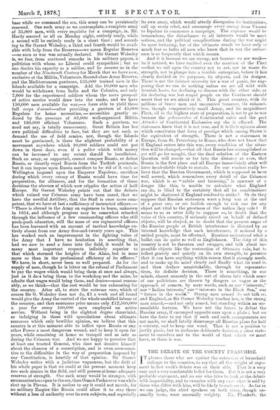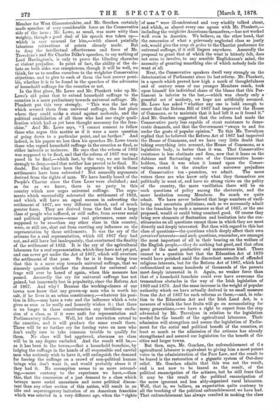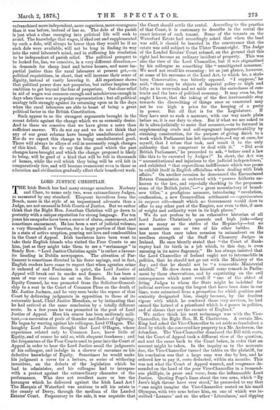THE DEBATE ON THE COUNTY FRANCHISE.
IT pleases those who are against the extension of household suffrage to the counties, to say that all the weight of argu- ment in last week's debate was on their side. That is a very easy and a very comfortable belief for them. But it is not a very probable statement, and no one who tries to look at the debate with impartiality, and to examine with any care what is said by those who differ with him, will be likely to endorse it. As far as we can judge, the chief speakers on both sides, though un- usually terse, were unusually weighty. Mr. Plunkett, the settlements have been subverted ? Not assuredly arguments of Conservative ten - pounders, we admit. The more derived from the rights of man. We have hardly heard of the voters there are who know only what they themselves are People's Charter since the Corn Laws were abolished ; and politically in want of, and have no strong views on the policy as far as we know, there is no party in this of the country, the more vacillation there will be on country which now urges universal suffrage. The argu- such questions of policy among the electorate, and the ments which successfully subverted the settlement of 1832, more hesitation among Members. So much we quite and which will have an equal success in subverting the admit. We have never believed that large numbers of vacil- settlement of 1867, are very different indeed, and of much lating and uncertain politicians, such as we necessarily admit greater force. They are derived from the fact that a large to the franchise by such a measure as that of 1867, or the one class of people who suffered, or still suffer, from severer social• proposed, would or could bring unmixed good. Of course they and political grievances—some real grievances, some only bring new elements of fluctuation and hesitation into the con- supposed to be so—than any other class in this country, stituencies on all questions except those in which they are most were, or still are, shut out from exerting any influence on the directly and deeply interested. But then with regard to this last representation by those settlements. It. was the cry of the class of questions—the questions which deeply affect their own artisans for a real representation, which till 1867 they had perceived interests—and such questions, remember, are amongst not, and still have but inadequately, that overturned the finality the most important of all in their bearing on the welfare of of the settlement of 1832. It is the cry of the agricultural the English people,—they do nothing but good, and that often labourers for a real representation, which they have not yet got, good of the most productive and momentous kind. There and can never get under the Act of 1867, which will overturn cannot be a question but that the Education Act of 1870 the settlement of that year. So far is it from being true would have perished amid the discordant assaults of offended that this is a mere step towards universal suffrage, that we religious interests, but for the Reform Act of 1867, which had sincerely question whether the demand for universal suf- enfranchised so many hundreds of thousands of the parents frage will ever be heard of again, when this measure has most deeply interested in it. Again, no weaker force than passed. Assuredly the cry for universal suffrage has not that of a household franchise could ever have overcome the gained, but immensely lost in popularity, since the Reform Act tremendous obstacles in the way of the Irish legislation of of 1867. And why ? Because the working-classes of our 1869 and 1870. And the same increase in the weight of popular towns now know that any grown-up man who is worth his authority which we have actually derived in no small measure salt, if he lives in an urban constituency,—whatever his posi- from the Act of 1867 for such reforms as these,—and, in rela- tion in life,—may have a vote and the influence which a vote tion to the Education Act and the Irish Land Act, in a gives so soon as he really and honestly wishes it ; that there measure of which the best fruits will go on accumulating for is no longer in those constituencies any invidious exclu- many generations,—we have a right to expect from the step sion of a class, as if it were unfit for representation and advocated by Mr. Trevelyan in relation to the legislation Parliamentary influence. Well, let that conviction extend to needed for the benefit of the agricultural labourers. Their the counties, and it will produce the same result there. admission will strengthen and assure the legislation of Parlia- There will be no further cry for forcing votes on men who ment for the social and political benefit of the counties, at don't really care to take common trouble to qualify for least as much as the admission of the artisans has already them. No class will feel aggrieved, abecause no class strengthened and assured our legislation for the benefit of the will be in any degree excluded. And the result will be,— cities and larger towns. as it has been in the towns,—that a household franchise, by But then, says, Mr. Goschen, the enfranchisement of tie lodging the suffrage in the hands of all responsible and careful agricultural labourer is equivalent to giving him a most potent men who seriously wish to have it, will extinguish the demand voice in the administration of the Poor Law, and the result to for forcing the suffrage on a crowd of non-political human be feared is the restoration of a gigantic system of Out-door beings who don't want it, and would probably abuse it if relief. Mr. Goschen admits that this was not the result, they had it. No assumption seems to us more astound- and is not now to be feared as the result, of the ing,—more contrary to the experience we have,—than political emancipation of the artisans, but he still fears that this, that the concession of a just demand to a class which it may be the result of the political emancipation of betrays more social uneasiness and more political discon- the more ignorant and less ably-organised rural labourers. tent than any other section of this nation, will result in an Well, that is, we believe, an expectation quite contrary to tine and supererogatory imitation of an American franchise all the teaching of the political enfranchisement we have had. which was selected in a very different age, when the "rights That enfranchisement has always resulted in making the class Member for West Gloucestershire, and Mr. Goschen certainly of man " were ill-understood and very windily talked about, made speeches of very considerable force on the Conservative and which, as almost every one agrees with Mr. Plunkett,— side of the issue ; Mr. Lowe, as usual, was more witty than including the weightier Americans themselves,—has not worked weighty, though a good deal of his speech was taken up— well even in America. We believe, on the other hand, that which is very unusual for him,—with almost painfully the concession of what a grievously neglected class so justly laborious reiterations of points already made. But ask, would give the coup (le grdce to the Chartist preference for to deny the intellectual effectiveness and force of Mr. universal suffrage, if it still lingers anywhere. Assuredly the Trevelyan's and Sir Charles Dilke's speeches, to say nothing of proposal to grant that of which the want is bitterly felt, does Lord Hartington's, is only to prove the blinding character not seem to involve, to any sensible Englishman's mind, the of violent prejudice. In point of fact, the ability of the de- necessity of granting something else of which nobody feels the bate on both sides was conspicuous, though it will be well, we want at all.
think, for us to confine ourselves to the weightier Conservative Next, the Conservative speakers dwell very strongly on the objections, and to give to each of them the best answer possi- deterioration of Parliament since its last reform. Mr. Plunkett, ble, whether it is to be found in the speeches of the advocates in a speech which proved how high a mark of thoughtfulness of household suffrage for the counties or not. and of oratory some of our younger Members reach, took In the first place, Mr. Lowe and Mr. Plunkett take up Mr. upon himself his individual share of the blame that this Par- Lowe's old point that to extend household suffrage to the liament is inferior to the last,--which was clearly only a • counties is a mere preliminary towards universal suffrage. Mr. graceful act of modesty, we hope not artificially assumed. Plunkett put this very strongly. " This was the last step Mr. Lowe has asked " whether any one is bold enough to which severed them from universal suffrage, the last place assert that the Reform Bill of 1867 had improved the House where they could make a stand against mob-rule, and the of Commons, or to maintain that it had left it as it found it." political annihilation of all those who had one single quali- And Mr. Goschen suggested that the reform had made the fication which had as yet been thought necessary for the fran- Conservative party less capable of stout resistance to demo- chise." And Mr. Lowe says, "I cannot consent to follow cratic demands, and that the Government "sways to and fro those who argue this matter as if it were a mere question under the gusts of popular opinion." To this Mr. Trevelyan of going down to a particular point, and no further." And replied that he believed the Reform Act of 1867 had improved indeed, in his papers no less than his speeches Mr. Lowe treats the House of Commons, and we have very little doubt that those who regard household suffrage in the counties as final, as taking everything into account, the HOuse of Commons, as a either imbecile or insincere. He says that the reform of 1832 legislative body, is better than it was. That Conservative was supposed to be final, and that the reform of 1867 was sup- resistance is less obstinate and firm, now that it leans on the posed to be Snal,—which last, by the way, we are inclined dubious and fluctuating votes of the Conservative house- strongly to deny,—and that neither has proved to be final. No holders, than it was when it leaned upon the Conser- doubt. But what have been the arguments by which those vatism rooted in the steadier and narrower prejudices settlements have been subverted ? Not assuredly arguments of Conservative ten - pounders, we admit. The more derived from the rights of man. We have hardly heard of the voters there are who know only what they themselves are People's Charter since the Corn Laws were abolished ; and politically in want of, and have no strong views on the policy as far as we know, there is no party in this of the country, the more vacillation there will be on country which now urges universal suffrage. The argu- such questions of policy among the electorate, and the ments which successfully subverted the settlement of 1832, more hesitation among Members. So much we quite and which will have an equal success in subverting the admit. We have never believed that large numbers of vacil- settlement of 1867, are very different indeed, and of much lating and uncertain politicians, such as we necessarily admit greater force. They are derived from the fact that a large to the franchise by such a measure as that of 1867, or the one class of people who suffered, or still suffer, from severer social• proposed, would or could bring unmixed good. Of course they and political grievances—some real grievances, some only bring new elements of fluctuation and hesitation into the con- supposed to be so—than any other class in this country, stituencies on all questions except those in which they are most were, or still are, shut out from exerting any influence on the directly and deeply interested. But then with regard to this last representation by those settlements. It. was the cry of the class of questions—the questions which deeply affect their own artisans for a real representation, which till 1867 they had perceived interests—and such questions, remember, are amongst not, and still have but inadequately, that overturned the finality the most important of all in their bearing on the welfare of of the settlement of 1832. It is the cry of the agricultural the English people,—they do nothing but good, and that often labourers for a real representation, which they have not yet got, good of the most productive and momentous kind. There and can never get under the Act of 1867, which will overturn cannot be a question but that the Education Act of 1870 the settlement of that year. So far is it from being true would have perished amid the discordant assaults of offended that this is a mere step towards universal suffrage, that we religious interests, but for the Reform Act of 1867, which had sincerely question whether the demand for universal suf- enfranchised so many hundreds of thousands of the parents gained, but immensely lost in popularity, since the Reform Act tremendous obstacles in the way of the Irish legislation of enfranchised more independent., more sagacious, more courageous than it was before, instead of less so. • The dole of the parish is just what a class emerging into political life will seek to avoid. The knowledge that wages, if eked out and supplemented by such a dole, will always be lower than they would be if no such dole were available, will not be long in finding its way into the rural labourer's mind, and in stiffening his resolution to be independent of parish relief. The political prospect to be looked for, lies, we conceive, in a very different direction,— in demands for cheap land and better houses, and more im- partial justice than the rural labourers at present get,—in political requisitions, in short, that will increase their sense of dignity, instead of vastly lowering it. All experience shows that political power does not pauperise, but rather inspires the ambition to get beyond the fear of pauperism. Out-door relief in aid of wages was common enough and mischievous enough in days when there was no popular representation ; but all political analogy tells strongly against its returning upon us in the days when the rural labourers are able to boast of being a great political factor in the British Constitution.
Such appear to us the strongest arguments brought in the recent deThate against the change which we so earnestly desire. And to these we conceive that we have given a more than sufficient answer. We do not say and we do not think that any of our great reforms have brought unadulterated good. Nor do we expect this change to bring unadulterated good. There will always be alloys of evil in necessarily rough changes of this kind. But we do say that the good which the past changes have brought and which the change proposed is likely to bring, will be good of a kind that will be felt in thousands of homes, while the evil which they bring will be evil felt in comparatively few, and will become evanescent even in those as education and civilisation gradually effect their beneficent work.




































 Previous page
Previous page